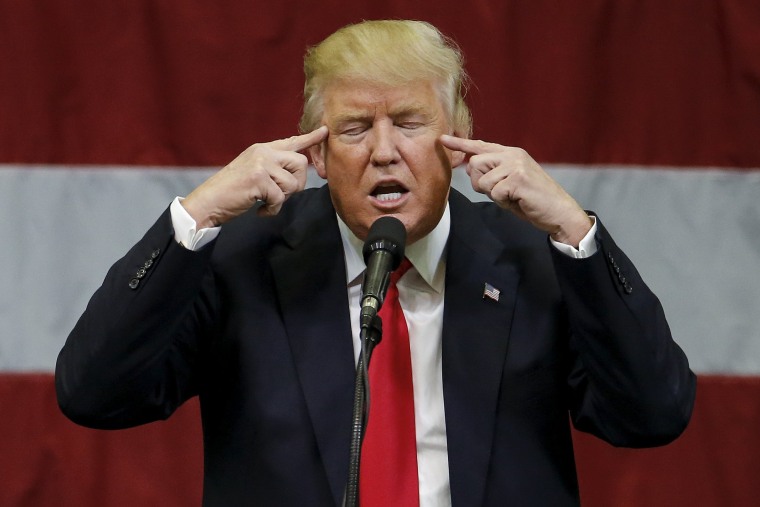With House Speaker Paul Ryan’s “count me out” declaration Tuesday, the prospects of a “savior” candidate to emerge at the GOP convention dimmed considerably. But if the long hard fight for delegates continues to point toward a possible open convention, the idea of finding a consensus nominee from outside the 2016 candidate pool won’t disappear – neither will the massive hurdles for any such effort.
Here's how the savior candidate could come about: If front-runner Donald Trump or Texas Sen. Ted Cruz cannot clinch the nomination after the first round of ballots, or second, or third, or a 23rd, the stalemated delegates could move in another direction to break the deadlock. According to Republican Party rules, after the first round, most of the 2,474 delegates have the freedom to freelance and vote for whomever they want, opening up the possibility of a scenario for a candidate not currently in the race to come out of the convention as the party’s nominee.
According to several Republican operatives, who note that a convention has not gone to a second ballot during their professional career, a white-horse scenario is unlikely.
“No one’s ever seen this before,” Russ Schriefer, a lifelong Republican strategist who has worked on six of the last seven presidential campaigns, said.
The Republican Party hasn't seen multiple rounds of balloting since the 1948 convention in Philadelphia when New York Gov. Thomas Dewey was elected on the third ballot. (But even in that contested convention, Dewey still participated in the primary process.)
RELATED: A Contested Convention? (Almost) Everything You Need to Know
Trump's disappointing electoral results in some states makes it more likely that he won't obtain a majority of the delegates heading into Cleveland. And his campaign's latest missteps in securing delegates at state conventions makes the nominating process in Cleveland unpredictable if balloting goes beyond the first round.
The idea behind a knight in shining armor swooping in to save the Republican Party has its roots in Trump and Cruz’s unpopularity among the establishment who favor “insider” candidates. During last week’s Wisconsin primary, one in three GOP voters said they would abandon the party altogether if either candidate becomes the nominee.
The Party Would be Damaged
But what strategists consider even riskier is electing an alternate candidate at a time when voters from both parties are very anti-establishment and anti-Washington. Exit polling in Wisconsin found that 52 percent of Republican voters "feel betrayed by politicians from the Republican Party."
Picking a savior candidate would further play into that frame and quickly tarnish the Grand Old Party’s credibility among angry voters, some warn.
“You would be on a path to a civil war which could be disastrous,” Greg Mueller, a GOP strategist working with an anti-Trump super PAC, added.
Republican strategist John Feehrey said it goes against the party's principles.
“If you don’t go through the formal process from getting input from voters, you can’t run as the standard bearer of the party. It goes against what the Republican Party stands for. It’s the party of the people,” he said.
It's Logistically Difficult
Even if a savior candidate were chosen, he or she would face massive logistical challenges in running against a Democratic candidate who has already raised money and deployed a ground operation from the primary process.
“It would be the equivalent of starting a race from a standing start and your opponents, in a mile race, would have at least a half-mile lead on you in terms of money, in terms of organization, in terms of vetting,” Schriefer said.
Democratic candidate Hillary Clinton is already raising money for the general election. Her several-hundred person staff has been running a national presidential campaign for months. She has participated in more than half a dozen debates and a dozen town halls and held hundreds of rallies, which means she's polished. She has been building a data base of voters for more than a year. Sen. Bernie Sanders has done the same - all necessary components for running for the White House.
“Even if [the primary] is a blade battle, you come out better for prime time,” Mueller said. “This other authentic consensus candidate has to dust off their campaign operatives for not just a state campaign, but a general election.”
With that in mind, any of the candidates who dropped out earlier in the race wouldn’t have to dust off too much before jump starting a new campaign. But voters are still likely to reject these candidates, especially in an election year where “losers” are viewed more unfavorably than years prior.
It's a Major Professional Risk
Any politician who would consider becoming the alternative candidate should stop and think about their political future. Feehrey warns that if Ryan were to take up the offer, “it would kill his reputation.”
Ryan, or any candidate, could be seen as a Republican villain who has no regard for the will of the people.
RELATED: Donald Trump's Big Plan to Stop a Contested Republican Convention
The most realistic way would be if all delegates, including the candidate’s operatives, agree on and unite behind the alternative. That consensus candidate would be an easier pill to swallow for Republican voters.
“If all earned delegates could live with this, that’s different than we’re going to steal [the election] from Cruz or Trump,” Mueller said.


